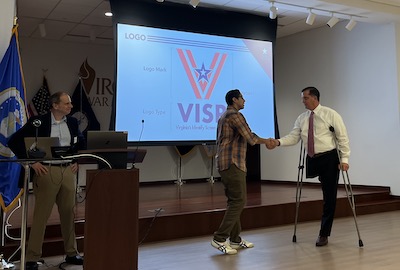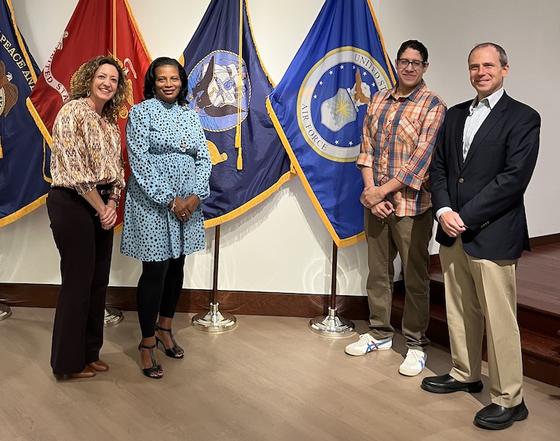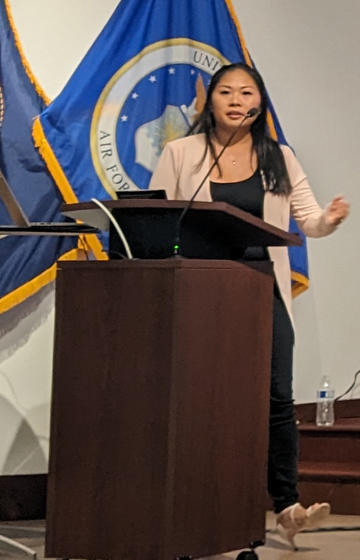A team of George Mason University researchers is doing its part to combat rising suicide rates among veterans and hopes to soon begin making a positive difference in the Northern Virginia community.

Keith Renshaw, a psychology professor and Mason’s associate provost for Undergraduate Education, is working with the Virginia Department of Veterans Services to oversee two projects that address suicide rates among combat veterans as part of the Governor’s Challenge to Prevent Suicide Among Service Members, Veterans and their Families.
Their work could prove especially critical in the Washington, D.C., metropolitan area with a strong veteran population.
More than four times as many veterans have died from suicide rather than in combat operations since 9/11, according to research released by Brown University in 2021.
The first project, which began late last year, is called Virginia’s Identify SMVF (Service Members, Veterans and Families), Screen for Suicide Risk, Refer for Services (VISR) mission. A $44,000 grant from the commonwealth allows for the training of employees of various local community agencies in military culture, better suicide screening methods and knowledge of resources available for struggling veterans.
The aim of the national strategy run by the U.S. Department of Veterans Affairs is to prevent suicide among service members, veterans and their families using a comprehensive public health approach.
“The whole idea is that some of these agencies involved might need certain things more than others,” Renshaw said. “Mental health centers have a lot in suicide training, but they may not have as much on military cultural competency. A veterans’ service organization understands the military, but might not have much knowledge about suicide.”

The mission takes on an added personal significance for the two Mason students heavily involved in the project.
Alice Beatty, a senior psychology major, is serving as the project coordinator. A returning student and mother of three, Beatty is the wife of an Army veteran and the daughter-in-law of a Vietnam veteran.
“VISR brings together two components that I am passionate about—military families and suicide prevention,” Beatty said, “so this project holds a special place in my heart. What I like most about the VISR program is that the participating agencies are working together and prioritizing this mission. In essence, we are saying to our military, veterans and their families, ‘We see you, we hear you, and we are here to listen and support you.’ ”

Prevention Symposium at the Virginia War Memorial. Photo provided
José Coll, a graduate student pursuing a master’s degree in graphic design, designed the logo for the VISR program. Like Beatty, he was drawn to the project for personal reasons.
“I’m an Air Force brat, and this program is about helping service members—active or retired—and their families with their mental health journey,” Coll said.
Renshaw, who is the principal investigator, said that he expects the program to be extended into the spring semester.
The second project, which comes through a $150,000 grant from the Virginia Department of Veterans Services’ Suicide Prevention and Opioid Addiction Services (SOS) Research Grant, seeks to address suicide prevention from a different angle.
Titled “Suicide and Substance Abuse Misuse Prevention for Veterans: Transdiagnostic Treatment Development and Pilot,” the project is being conducted in collaboration with the Virginia Department of Veterans Services, principal investigator Christianne Esposito-Smythers and her new Center for Evidence-Based Behavioral Health within the College of Humanities and Social Sciences.
Esposito-Smythers is renowned for her work developing, testing, and disseminating treatments targeting risk factors in teens. Now, she and her team will adopt the same treatment for adult veterans with a focus on suicide risk, PTSD, and substance abuse.
“We’ll adapt this treatment program to be appropriate for adult veterans,” Renshaw said.
Mason alum Sarah Campbell, a former doctoral student of Renshaw’s who previously worked at a VA medical center, is helping to modify the program for adult veterans. The team plans to test the program through training with 50 clinicians throughout Northern Virginia in spring 2024, with hopes to soon after begin aiding those in the area in need.

Related Stories
- January 27, 2026
- January 20, 2026
- January 8, 2026
- December 12, 2025
- November 11, 2025

